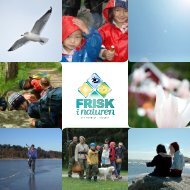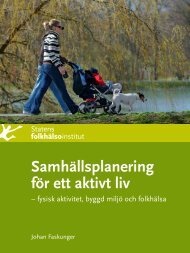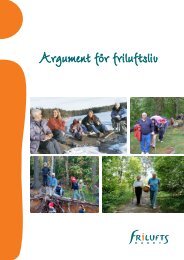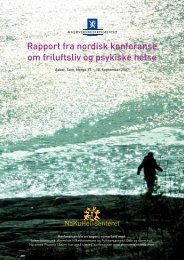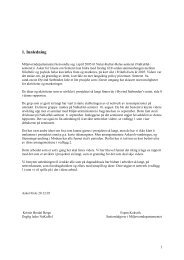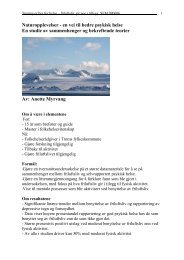Green Care: A Conceptual Framework - Frisk i naturen
Green Care: A Conceptual Framework - Frisk i naturen
Green Care: A Conceptual Framework - Frisk i naturen
You also want an ePaper? Increase the reach of your titles
YUMPU automatically turns print PDFs into web optimized ePapers that Google loves.
concise definition stating that wilderness therapy “is an experiential<br />
program that takes place in a wilderness or remote outdoor setting”.<br />
Essentially, wilderness therapy uses the ‘wilderness as co-therapist’ in<br />
addition to any professional therapy that might take place whilst out in the<br />
wilderness.<br />
Wilderness therapy is an emerging treatment intervention which uses a<br />
systematic approach to work largely with adolescents with behavioural<br />
problems. Although this is not the only cohort that can benefit from<br />
wilderness therapy, it is most often used with this group to help<br />
them address any emotional, adjustment, addiction or psychological<br />
problems (Hobbs and Shelton, 1972; Bandoroff, 1989; Russell, 1999;<br />
Russell and Phillips-Miller, 2002; Caulkins et al, 2006; Russell, 2006a;<br />
Bettmann, 2007). Programmes typically provide healthy exercise and<br />
diet through hiking and physical activity, individual and group therapy<br />
sessions, educational curricula, primitive skills, group-living with peers,<br />
opportunities for solo time and reflection leadership training and challenges<br />
resulting from ‘back-to basics’ living.<br />
The rationale for wilderness interventions involves separating participants<br />
from daily negative influences and placing them in safe outdoor<br />
environments. Spending time in a natural setting enables participants to<br />
access those aspects of their self that may elude them in more conventional<br />
personal development or therapeutic settings.<br />
The key therapeutic factors emerging from several reviews of the<br />
wilderness therapy literature (Hans, 2000; Wilson and Lipsey, 2000; Russell<br />
and Phillips-Miller, 2002; Russell, 2006b) which facilitate a positive<br />
behavioural change include personal and interpersonal development,<br />
restructuring of staff-youth relationships and reduced recidivism rates.<br />
Wilderness therapy programmes facilitate self-awareness, communication,<br />
cooperation and contribution to the wellbeing of the group whilst allowing<br />
participants to discover what they have taken for granted (Connor,<br />
2007). Participation in wilderness therapy also helps to address problem<br />
behaviours by fostering personal and social responsibility and providing the<br />
opportunity for emotional growth (Russell, 1999).<br />
45



